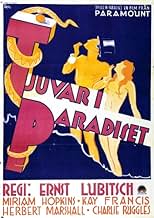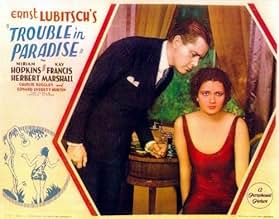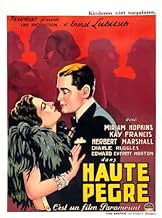A gentleman thief and a lady pickpocket join forces to con a beautiful perfume company owner. Romantic entanglements and jealousies confuse the scheme.A gentleman thief and a lady pickpocket join forces to con a beautiful perfume company owner. Romantic entanglements and jealousies confuse the scheme.A gentleman thief and a lady pickpocket join forces to con a beautiful perfume company owner. Romantic entanglements and jealousies confuse the scheme.
- Director
- Writers
- Stars
- Awards
- 6 wins total
- The Major
- (as Charlie Ruggles)
- Annoyed Opera Fan
- (uncredited)
- Insurance Agent
- (uncredited)
- Commercial Singer
- (uncredited)
- Maid
- (uncredited)
- Woman with Wrong Handbag
- (uncredited)
- Venetian
- (uncredited)
- Waiter in Venice
- (uncredited)
- Radio Commentator
- (uncredited)
- Russian Visitor
- (uncredited)
- Elderly Servant
- (uncredited)
- Party Guest
- (uncredited)
- Director
- Writers
- All cast & crew
- Production, box office & more at IMDbPro
Featured reviews
Point #2: something is terribly wrong in Paradise if the peak era of his work, 29-33, remains in shadow today. Where are the VHS/DVD releases of these wonderful films? Nowhere that I can find them; hopefully the good folks at Turner will continue reviving the early sound Lubitsches. I waited 25 years to see this one again, and the wait was not in vain. Those 25 years put a bit of snow on my roof, but they also allowed me to drink in the ambrosia that is this film with a bit more appreciation than I had at 16. And what intoxicating ambrosia it is! Script, performances, directorial vision are all exquisite. The leads are inspired (oh, for a night with Kay Francis!); the supporting players, expertly calibrated farceurs. The utilization of music as ironic counterpoint to the visuals rivals Clair; the title song, sung over the opening credits, will make your heart race, and break, at the same time. And the look of the film (Art Deco, lovingly handrubbed to a burnished glow) will linger with you forever.
Again and again, Lubitsch pulls rabbits out of hats: scenes like the deepening of Herbert Marshall and Kay Francis' relationship from business to pleasure 'seen' in a clock face are emblematic of what makes this such a special film. Its story is slight, frothy, very nearly silly; yet Lubitsch's knowing observation of small, telling details makes it magical. TROUBLE is not a timeless film, anchored as it is to a very specific time (Long Ago) and place (Far Away), which only deepens its charm and its seductive tugging on the audience's sleeve. I've watched it three times in a night, and three times more the following night - not behavior I usually exhibit. But the siren call of its lively, civilized wit is such that I'm hitting 'rewind' the moment it ends - I don't want to break the spell and return to reality just yet. As fertile as the preCode era is, as many classics as that golden period continues to yield up to those willing to discover them...TROUBLE IN PARADISE is the most glorious of them all.
"Trouble in Paradise" is Lubitsch's unqualified masterpiece. This pre-code sophisticated comedy epitomizes the European attitude toward sex in its very first scene between Hebert Marshall and Miriam Hopkins. Marshall reveals he has stole Hopkin's garter without her knowing it and she leaps in his lap. She checks -- at the dinner table no less -- realizes it is gone and with the admiration of one thief for another leaps into his lap. "Darling!" she says. No one has to guess what she has in mind, although it is all done with the wit and brio that the "Lubitsch Touch," refers to.
It's great to have this film readily available and the DVD version includes an informative and enlightening commentary (Marshall only had one leg and his lurching walk made a certain speedy cutting necessary that helps give the film it's light, speedy quality).
Lubitsch also made "Shop Around the Corner," remade by Nora Ephron as "You've Got Mail," and "Ninotcha," with Greta Garbo. His musicals with Maurice Chevalier and Jenette MacDonald, such as "The Merry Widow," are also worth seeking out.
Thieves Lily (Miriam Hopkins) and Gascon Monescu (Herbert Marshall) meet and fall in love in Venice. They then thieve their way across Europe until they hit Paris. They have no compunction about stealing anything from anybody. Part of what turns them on about one another is the stealing. Mariette Colet is the owner of Colet cosmetics. She has apparently inherited this firm from her late husband. She has no real interest in running the place and prefers to spend extravagantly on clothes, furs, and cars. She has no compunction about doing so in hard times. Lily and Monescu decide to steal from Madame Colet since she likes to delegate all of the number crunching work to secretaries, and Monescu charms her into giving him the position. He doesn't intend to embezzle from her. He's just going to clean her out of cash like the conventional thief that he is before he exits the premises.
But during the weeks they are working together Monescu and Madame Colet begin to fall for one another. They are both people of taste and refinement, so they have much in common. So now there is this triangle of which Monescu is painfully aware. Will he stay with Colet and abandon Lily? Will he perhaps spend one night with Colet AND leave with Lily? Colet seems like the type that if it was just one night of passion she wouldn't be upset by that either. Watch and find out.
It's all very sophisticated, and the dialogue is clever from beginning to end. You can feel the sexual tension in the air. Charles Ruggles and Edward Everett Horton play romantic rivals for Colet who weren't getting anywhere with her before Monescu hit town, and now that he's here they blame him for their failure . C. Aubrey Smith is a member of Colet's board of directors who is more than a little suspicious of Monescu.
If you want to see romance played out realistically in an adult fashion, give this film a try.
Did you know
- TriviaThe scenes in which Herbert Marshall is running up and down the stairs at Madame Colet's were done with a double who is only seen from the rear. Mr. Marshall lost a leg in WWI and although it was almost impossible to notice that he used a prosthesis, he could not perform any action that called for physical agility.
- Goofs(at around 10 mins) A very clear shadow of a boom mic moves against the wall/screen behind Lily, anticipating her next action (rising and moving toward Gaston).
- Quotes
Gaston Monescu: Madame Colet, if I were your father, which fortunately I am not, and you made any attempt to handle your own business affairs, I would give you a good spanking - in a business way, of course.
Mariette Colet: What would you do if you were my secretary?
Gaston Monescu: The same thing.
Mariette Colet: You're hired.
- Crazy creditsIn the opening credits, the words 'Trouble in' appear and then a bed before the word 'paradise', subliminally indicating that sex is at least part of the film's plot. It was done so subtly for the time that censors didn't notice it until the film's attempted re-release in 1935.
- ConnectionsFeatured in Paramount Presents (1974)
- SoundtracksTrouble in Paradise
Music by W. Franke Harling
Lyrics by Leo Robin
Sung by Donald Novis (uncredited)
[Played during opening title card and credits]
- How long is Trouble in Paradise?Powered by Alexa
Details
Box office
- Budget
- $519,706 (estimated)
- Gross worldwide
- $928
- Runtime1 hour 23 minutes
- Color
- Aspect ratio
- 1.37 : 1
Contribute to this page






































